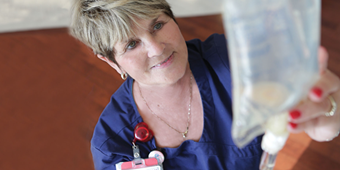Family Matters: Colorectal Cancer and Heredity

Answer a few questions and we'll provide you with a list of primary care providers that best fit your needs.
One out of five people diagnosed with colorectal cancer has a family history of the disease. That's why it's important to learn your family’s health history, says James Ouellette, DO, who specializes in surgical oncology. Once you do, share the information with your doctor, and follow your doctor’s recommendations for screening for the disease.
Family History Of Colorectal Cancer Or Polyps
If your family has a history of colorectal cancer or adenomatous polyps (a type of polyp that can become cancerous), your risk is increased. Your risk is even higher if a relative was diagnosed with colorectal cancer when they were younger than 45, or if more than one of your first-degree relatives (a parent, child or sibling) has been diagnosed with it.
If you have a first-degree relative who has had colorectal cancer, talk to your doctor or health care provider. Although the recommended age to be screened for the disease is 45, your doctor may want you to be screened sooner.
Inherited Syndromes
A small percentage of people who develop colorectal cancer have gene defects that can lead to the disease. The most common are:
Familial adenomatous polyposis (FAP). About one percent of all colorectal cancers are due to FAP. In the most common type, hundreds or even thousands of polyps develop in your colon and rectum, usually when you’re in your teens or early adulthood. Cancer usually develops in one or more of these polyps as early as age 20. By age 40, almost all people with this disorder will have developed colon cancer, unless the colon was removed to prevent it. People with FAP are also at increased risk for cancers of the stomach, small intestines, and some other organs.
Because FAP starts at a young age, screening often begins in childhood. For children at risk, genetic testing can be of value to spare the child from having annual screenings (for example, sigmoidoscopy or colonoscopy) if the mutation is not present.
Lynch syndrome accounts for three to five percent of all colorectal cancers. In most cases, it is caused by a defect in the genes that normally help repair DNA damage.
People with Lynch syndrome develop cancers when they are young, although not as young as in FAP. They also may have polyps, but they tend to only have a few, not hundreds as in FAP. If you have Lynch syndrome, your lifetime risk of developing colorectal cancer is as high as 80 percent.
Race And Ethnicity
Data shows that African Americans have a 20 percent higher rate of colorectal cancer than the general U.S. population, says Dr. Ouellette. “They also have a lower rate of getting screened for the disease which, we believe, is a significant factor,” he adds.
Ashkenazi Jews (Jews of Eastern European descent) have one of the highest risks of colorectal cancer of any ethnic group in the world. Researchers have found several gene mutations which cause this increased risk. If you fall in this category, be sure to inform your doctor or health care provider.
Should I Be Tested?
Your initial screening for colorectal cancer should be at age 45, says Dr. Ouellette, or younger if your risk is high. “The American Cancer Society changed their recommendation from age 50 to 45 because we’re seeing more and more young people diagnosed with the disease,” he says. “I’ve had patients in their 20s, and many in their 40s, with colorectal cancer.”
A colonoscopy screening may find a polyp before it becomes cancerous, Dr. Ouellette explains. “This means that getting tested has the potential to actually prevent the cancer from occurring. If we can prevent a polyp from changing to a cancer, then cancer treatment isn’t necessary, and that’s a big deal.”
Click play to watch the video or read video transcript.
Answer a few questions and we'll provide you with a list of primary care providers that best fit your needs.
Source: American Cancer Society; James Ouellette, DO






